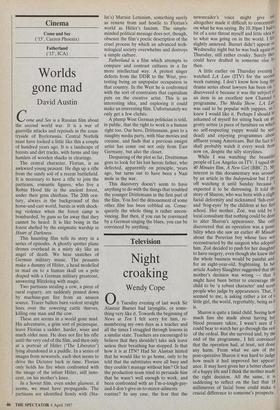Television
Night croaking
Wendy Cope
Alastair Burnet had laryngitis, or some- thing very like it. Towards the beginning of News at Ten I felt sorry for him, re- membering my own days as a teacher and all the times I struggled through lessons in a similar state. Teachers are encouraged to believe that they shouldn't take sick leave unless their breathing has stopped. Is that how it is at ITN? Had Sir Alastair hinted that he would like to go home, only to be told that the substitutes were all busy and they couldn't manage without him? Or had the production team tried to persuade him that he wasn't well enough to work, and been confronted with an I'm-a-tough-guy- and-I-don't-give-in-to-minor-ailments routine? In any case, the fear that the newsreader's voice might give out altogether made it difficult to concentrate on what he was saying. By 10.30pm I had a bit of a sore throat myself and little idea as to what was going on in the world. I felt slightly annoyed. Burnet didn't appear on Wednesday night but he was back again on Thursday, still rather croaky. Surely they could have drafted in someone else by then.
A little earlier on Thursday evening ! watched LA Law (ITV) for the second week running. I don't know how long this drama series about lawyers has been on. I discovered it because it was the subject of an item in an excellent new Channel 4 programme, The Media Show. LA Low I was said to be popular with yuppies, so knew I would like it. Perhaps I should be ashamed of myself for sitting back on rOY grotty settee (a piece of furniture on which no self-respecting yuppy would be sea dead) and enjoying programmes about affluent young Americans. But the fact is I shall probably watch it every week from now on, despite the silly storylines. While I was watching the beautiful people of Los Angeles on ITV, I taped the 40 Minutes film, A New Girl (BBC 2). MY interest in this documentary was aroused by an article in the Independent but I pot off watching it until Sunday because expected it to be distressing. It told the story of Sharon, who was born with a sligbt facial deformity and nicknamed 'fish-eyes and 'frog-eyes' by the children at her first school. Her mother, Zoe, was told by local consultant that nothing could. be done to alter Sharon's appearance. She onlY discovered that an operation was a posst' bility when she saw an earlier 40 Minutes about the Peruvian boy whose face was reconstructed by the surgeon who adopted him. Zoe decided to push for her daughter to have surgery, even though she knew that the whole business would be painful and, for an eight-year-old, frightening. In her article Audrey Slaughter suggested that the mother's decision was wrong — that it might have been better to encourage the child to be 'a robust character' and scat people who judge by appearances. That, it seemed to me, is asking rather a lot of a little girl, the world, regrettably, being as it is.
Sharon is quite a timid child. Seeing hold much fuss she made about having her blood pressure taken, I wasn't sure if I could bear to watch her go through the rest of the ordeal. But she survived and, by the end of the programme, I felt convinced that the operation had, at least, not done any harm. From what we saw of the post-operative Sharon it was hard to judge how much it had improved her appear- ance. It may have given her a better chance of a happy life and I think the mother made the right decision. All the same, it i5 saddening to reflect on the fact that 18 millimetres of facial bone could make crucial difference to someone's prospects.


























































 Previous page
Previous page